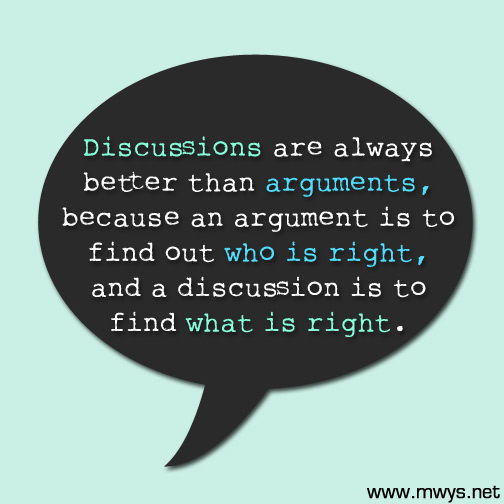
graphic © eminentlyquotable.com
Discussions are always better than arguments, because an argument is to find out who is right, and a discussion is to find what is right.
An argument is often associated with a heated exchange of words, with each person trying to prove their point and assert their own viewpoint as the correct one. Arguments can be emotionally charged and can quickly turn into personal attacks, rather than a respectful exchange of ideas.
On the other hand, discussions are a more collaborative and open-minded approach to problem-solving. Discussions involve the exchange of ideas, perspectives, and information, with the goal of finding a solution that is best for all parties involved. Discussions are less about winning or being right, and more about finding a solution that works for everyone.
It’s human nature to defend one’s opinion – especially if we have much emotional or physical investment in it. When a person questions or discredits it, we tend to get emotional. Why? Because our beliefs are considered part of our unique identity.
Discussions tend to be more productive than arguments as they allow all parties to express their viewpoint and consider different perspectives. This can lead to a deeper understanding of the issue at hand and can also foster mutual respect and understanding.
Not only is arguing counterproductive in ironing out differences, it’s also harmful to one’s health especially in women. Researchers from Ohio State University’s Institute for Behavioral Medicine Research reached a conclusion that marital arguments alter a woman’s hormone levels, weakening her immune system in the process. They looked specifically at epinephrine, norepinephrine, cortisol, as well as ACTH, growth hormone and prolactin. Blood analysis showed that those hormone levels rose among women who reacted negatively to their husbands’ withdrawal during the arguments. The more the man withdraws, the greater the hormone levels rise. “If the levels stay up long enough, it can have immune responses,” explained the professor of medical microbiology and immunology, Ronald Glaser.
Julia Galef, president of the Center For Applied Rationality, suggests that a mental shift is needed to remain fair minded and objective in arguments. Instead of thinking about the argument as a battle in which one must win, think of it as a partnership in which the goal is to figure out the right answer or the solution to a problem. This will save your relationship and your health. 😉
One of the keys to a successful discussion is active listening, which involves not just hearing what the other person is saying but also trying to understand their point of view. By actively listening, we can gain a better understanding of the other person’s perspective and can also identify areas of agreement and disagreement.
In conclusion, discussions are a more productive, collaborative and open-minded approach to problem-solving. By actively listening and engaging in discussions, we can gain a deeper understanding of the issue at hand and can find solutions that work for everyone.
😳 What Tinnitus Does To Your Brain Cells (And How To Stop It)
After 47 years of studies and countless brain scans done on more than 2,400 tinnitus patients, scientists at the MIT Institute found that in a shocking 96% of cases, tinnitus was actually shrinking their brain cells.
As it turns out, tinnitus and brain health are strongly linked.
Even more interesting: The reason why top army officials are not deaf after decades of hearing machine guns, bombs going off and helicopter noises…
Is because they are using something called "the wire method", a simple protocol inspired by a classified surgery on deaf people from the 1950s...
★ How To Get Rid Of Nail Fungus:
★ Does Your Salad Contain This Vegetable?
★ Top 10 Most Valuable Medicinal Herbs:






I agree 100% that “what is right” is more important than “who is right”, however it is not clear that “argue” means “who is right” or that, “discuss” means “what is right”… especially given the origin of the two words:
ARGUE- from Latin “arguere” (“to make clear”) from the root *arg (“to shine”) with the cognate “argent” (“silver”)
DISCUSS – from Latin “dis” (“apart”) and “quatere” (“to shake”)… with the cognates, “quash” and “castrate”
Hope you have an email distribution list to receive your daily dose of inspiration.
Thanks!